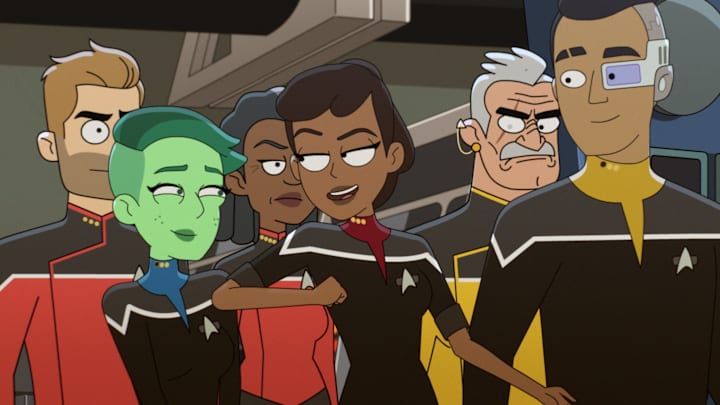Star Trek: Lower Decks is a flawed show that survived as long as it did because it embraced decades-old characters, storylines, concepts, and just any piece of nostalgia it could add to its Rick and Morty cloned comedic adventures. The animated series will say goodbye after five seasons without leaving much of an impact on the greater Star Trek universe.
A show that had its fanbase, Lower Decks was never a ratings winner for Paramount+. It was an expensive endeavor for a niche audience and had it been greenlit in 2023, it would've had one season. Lower Decks survived because it came along in a time when streaming services and their banks, were less worried about making money and more worried about growing its libraries.
So Lower Decks got more and more seasons than it probably deserved, but when banks expected returns on their loans, we started to see shows like Lower Decks start to have a shorter and shorter shelf life. It was a niche show for a niche audience, further reducing its broad appeal by making it a very gory and messy outing. It reveled in being closer to Rick and Morty than Star Trek: Prodigy and that's why its fanbase liked it so much.
Still, at the end of the day, it was a comedy that was built around a single Star Trek episode. The idea of the show, even the title of the show, came from a Star Trek: The Next Generation episode, "Lower Decks", which saw a focus on some of the younger, non-bridge crew members of the USS Enterprise-D. The concept of the episode was interesting, but when broadcast across dozens of episodes, it lost some of its intrigue.
The show knew it couldn't sustain its formula of only focusing on the "lower decks" crew, as they made the main character the daughter of the series' captains. Most of the bridge crew were regular or recurring characters. Thus negating the idea of a show about the lesser-known members of a starship.
It's part of the reason the show didn't have longer staying power. It's also the concern we should have about the new live-action comedy that Star Trek is producing. According to co-series creator Justin Simien (via TV Line), the concept of the show is borrowed heavily from The Next Generation and Deep Space Nine episodes where "nothing happens".
As the show is about aliens working on a pleasure planet resort, the connection to Risa and the episodes that surround it has been brought up. While not outright mentioned, there is a belief that the show will borrow heavily from episodes like "Let He Who Is WIthout Sin...", an episode where the Deep Space Nine crew takes some time to relax on the pleasure planet Risa.
It was a silly episode, one that seems to have a special place in many Star Trek fan's hearts. Yet if we learned anything from Lower Deck's lack of a broad appeal, this may be a doomed concept. Trying to build a Star Trek show around a concept and idea that is decidedly not Star Trek is a bad idea. Lower Decks only survived as long as it did because of the era it was created in.
Now, return on investment is going to be a requirement. You're going to need to prove you can either bring in new subscribers or increase the bottom line on hours watched. If you can't do that, you're not going to last.
As there are concerns over the decidedly un-Star Trek-like concepts that are coming out in recent weeks, it's fair to wonder if this new live-action comedy series is going to be enough like Star Trek to hold the core viewer base, or if it's going to be so vastly different it doesn't appeal to Trek diehards.
If that's the case, can it appeal to a new type of fan? If Lower Decks is any example, it likely won't.
